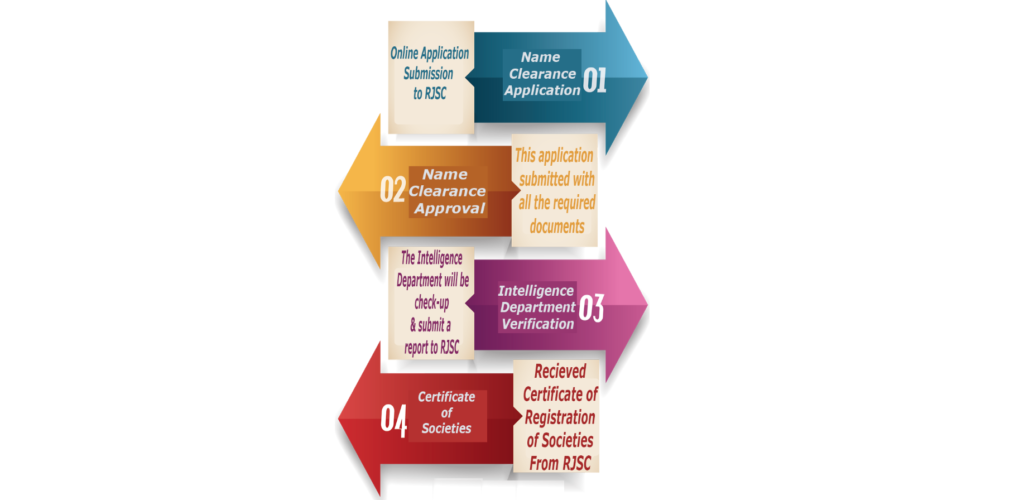Registering a non-profit association

In Bangladesh, registering a non-profit association involves navigating through legal procedures governed by different authorities. Non-profit organizations can register with either the Registrar of Joint Stock Companies and Firms (RJSC) or the Department of Social Services (DSS) under the Ministry of Social Welfare. Each option serves distinct purposes, catering to organizations with varying objectives and activities.
Step 1: Choose the Type of Non-profit Organization
1.1. Decide on the specific type of non-profit organization you want to establish, such as a charitable trust, society, or nonprofit company.
Step 2: Draft Memorandum and Articles of Association
2.1. Prepare the Memorandum of Association (MOA) and Articles of Association (AOA) outlining the objectives, mission, rules, and regulations of your organization. 2.2. Ensure that the MOA and AOA comply with the relevant laws and regulations in Bangladesh, including the Companies Act.
Step 3: Choose a Name for Your Organization
3.1. Select a unique name for your non-profit organization. 3.2. Check the availability of the chosen name with the Registrar of Joint Stock Companies and Firms (RJSC) to ensure it is not already in use.
Step 4: Form a Governing Body
4.1. Establish a governing body, such as a board of directors or trustees, to oversee the activities and operations of the organization. 4.2. Determine the composition, roles, and responsibilities of the governing body members.
Step 5: Designate a Registered Office Address
5.1. Have a physical address within Bangladesh to serve as the registered office of your organization. 5.2. Ensure that the registered office address is suitable for official correspondence and legal purposes.
Step 6: Obtain Application Forms
6.1. Obtain the necessary application forms for registration from the Registrar of Joint Stock Companies and Firms (RJSC) or its website. 6.2. Ensure that you have all the required documents and information ready before proceeding with the application.
Step 7: Complete and Submit Application Forms
7.1. Fill out the application forms accurately and completely, providing all the required details about your organization, including its name, objectives, governing body members, and registered office address. 7.2. Attach the Memorandum of Association (MOA), Articles of Association (AOA), and other supporting documents as specified in the application form. 7.3. Pay the required registration fees as stipulated by the RJSC.
Step 8: Submit Documents to the Registrar
8.1. Submit the completed application forms, along with the supporting documents and registration fees, to the Registrar of Joint Stock Companies and Firms (RJSC). 8.2. Ensure that the submission is made within the designated time frame and through the appropriate channels specified by the RJSC.
Step 9: Publication in Newspapers
9.1. After submitting the application, publish a notice of registration in at least two widely circulated newspapers in Bangladesh. 9.2. The notice should include details such as the name of the organization, its objectives, and the registered office address, as well as the date of registration.
Step 10: Receive Certificate of Registration
10.1. Upon successful review and approval of the application by the RJSC, you will receive a Certificate of Registration for your non-profit organization. 10.2. The Certificate of Registration officially recognizes the legal existence of your organization under the laws of Bangladesh.
Step 11: Tax Registration and Compliance
11.1. Register your non-profit organization for tax purposes with the National Board of Revenue (NBR) if it meets the criteria for taxation under Bangladeshi law. 11.2. Ensure compliance with all tax-related obligations and regulations applicable to non-profit organizations in Bangladesh.
Step 12: Fulfill Other Legal Requirements (if applicable)
12.1. Depending on the nature of your organization’s activities, you may need to fulfill additional legal requirements, such as obtaining approval from the NGO Affairs Bureau for foreign-funded NGOs. 12.2. Ensure compliance with all relevant laws, regulations, and procedures throughout the registration process and ongoing operations of your non-profit organization.
By following these detailed steps and ensuring compliance with all legal requirements, you can successfully register a non-profit organization in Bangladesh. Consider seeking guidance from legal experts or professionals experienced in non-profit registration to navigate the process effectively and avoid any potential challenges or complications.
Registration with Registrar of Joint Stock Companies and Firms (RJSC):
Eligibility:
- Suitable for organizations intending to operate as non-profit companies, societies, or trusts.
- Non-profit companies often engage in charitable, educational, religious, or similar activities.
Procedure:
- Preparation of Documents: Draft the Memorandum of Association (MOA) and Articles of Association (AOA) in compliance with the Companies Act, 1994. These documents outline the organization’s objectives, rules, and regulations.
- Name Clearance: Choose a unique name for the organization and obtain clearance from the RJSC. The selected name should not be identical to any existing entity and must comply with naming guidelines provided by the RJSC.
- Application Submission: Complete the prescribed application form available from the RJSC. Ensure that all required information is accurately provided, including details about the organization’s objectives, registered office address, and governing body members.
- Submission of Documents: Submit the application form along with the MOA, AOA, and other necessary documents to the RJSC. Required documents may include identity proofs of governing body members, proof of registered office address, and payment of registration fees.
- Publication Requirement: Publish a notice of registration in at least two newspapers, one in Bengali and another in English. This notice should contain information about the organization’s name, objectives, registered office address, and date of registration.
- Certificate Issuance: Upon approval of the application and compliance with all legal requirements, the RJSC issues a Certificate of Incorporation. This certificate officially recognizes the legal existence of the non-profit organization under the laws of Bangladesh.
Registration with Department of Social Services (DSS):
Eligibility:
- Suitable for social welfare organizations engaged in poverty alleviation, community development, disability rights, and other social services.
- Typically applies to associations, foundations, and NGOs working in the field of social welfare.
Procedure:
- Application Preparation: Gather required documents, including the organization’s constitution, activities plan, and financial projection. Ensure that the organization’s objectives align with the social welfare activities recognized by the DSS.
- Application Submission: Submit the application form, along with the supporting documents, to the Department of Social Services. The application should provide comprehensive details about the organization’s activities, governance structure, and intended impact.
- Field Visit: DSS officials may conduct a field visit to verify the organization’s activities, infrastructure, and compliance with social welfare standards.
- Approval Process: The application undergoes review and evaluation by DSS authorities to assess its alignment with social welfare objectives and compliance with regulatory requirements.
- Registration: Upon approval, the organization is registered under the Department of Social Services, and a registration certificate is issued. This certificate validates the organization’s legal status and its authorization to operate in the field of social welfare.
- Annual Renewal: Registered organizations must renew their registration annually by submitting updated documents, reports, and activity plans to the DSS. This ensures ongoing compliance with social welfare standards and regulatory requirements.
Key Differences:
- Purpose: RJSC registration is suitable for organizations with broader objectives, while DSS registration is specifically for social welfare organizations.
- Legal Structure: RJSC registration involves forming a company, society, or trust under the Companies Act, 1994, while DSS registration applies to associations and NGOs engaged in social welfare work.
- Regulatory Oversight: RJSC-regulated organizations comply with the Companies Act, 1994, while DSS-regulated organizations adhere to guidelines set by the Department of Social Services.
In conclusion, registering a non-profit association in Bangladesh requires careful consideration of legal procedures and regulatory requirements. By choosing the appropriate registration option and following the prescribed steps, organizations can establish their legal presence and pursue their charitable or social welfare objectives effectively. It is advisable to seek professional guidance to ensure compliance with all legal obligations and maximize the impact of the organization’s activities.
For registering an alumni association, it would be more appropriate to apply for registration with the Registrar of Joint Stock Companies and Firms (RJSC). Here’s why:
RJSC Registration:
- Eligibility: Alumni associations typically operate as non-profit organizations with objectives related to educational or social activities. They often engage in charitable, educational, or similar endeavors, which align with the activities of non-profit companies, societies, or trusts.
- Procedure:
- Preparation of Documents: Drafting the Memorandum of Association (MOA) and Articles of Association (AOA) is essential, outlining the objectives, rules, and regulations of the association.
- Name Clearance: Choosing a unique name for the association and obtaining clearance from the RJSC is necessary to ensure it complies with naming guidelines and isn’t identical to any existing entity.
- Application Submission: Completing the prescribed application form with accurate details about the organization’s objectives, registered office address, and governing body members.
- Submission of Documents: Submitting the application form along with the MOA, AOA, and other necessary documents, such as identity proofs of governing body members and proof of registered office address, to the RJSC.
- Publication Requirement: Publishing a notice of registration in at least two newspapers, one in Bengali and another in English, to inform the public about the association’s registration details.
- Certificate Issuance: Upon approval of the application and compliance with all legal requirements, the RJSC issues a Certificate of Incorporation, officially recognizing the legal existence of the non-profit organization under Bangladeshi laws.
Given that alumni associations often function as non-profit entities engaged in educational, charitable, or social activities, registering with the RJSC would be more suitable. This process aligns with the objectives and activities of such associations and provides a legal framework for their operations.
In summary, for an alumni association, registering with the Registrar of Joint Stock Companies and Firms (RJSC) would be the appropriate choice, considering its alignment with the association’s objectives and activities.
After registering an association in Bangladesh, there are several documents and records that need to be maintained on a yearly basis to ensure compliance with regulatory requirements and to fulfill reporting obligations. Here’s a list of the documents and records typically required:
- Annual Financial Statements: Prepare annual financial statements including:
- Income Statement (Profit and Loss Account)
- Balance Sheet
- Cash Flow Statement (if applicable)
- Annual Report: Prepare an annual report providing an overview of the association’s activities, achievements, financial performance, and future plans.
- Minutes of Meetings: Maintain minutes of all general meetings and committee meetings held throughout the year. These minutes should document decisions made, resolutions passed, and actions taken during the meetings.
- Membership Records: Maintain an updated register of members, including their names, addresses, contact details, and membership status.
- Financial Records: Keep detailed financial records, including receipts, invoices, vouchers, bank statements, and accounting ledgers.
- Tax Records: Maintain records related to tax compliance, including:
- Tax returns filed with the National Board of Revenue (NBR)
- Supporting documents for tax deductions, exemptions, or refunds claimed
- Any correspondence with tax authorities
- Annual Renewal Documents: Renew registration with the appropriate authority (e.g., RJSC or DSS) by submitting updated documents, reports, and activity plans.
- Compliance Documents: Ensure compliance with all legal requirements by maintaining:
- Copies of the association’s constitution or bylaws
- Copies of registration certificates and other regulatory approvals
- Any permits or licenses required for specific activities or events
- Correspondence Records: Keep records of all correspondence with regulatory authorities, government agencies, stakeholders, and members.
- Audit Reports: If required, maintain copies of audit reports prepared by external auditors or internal audit reports.
- Donation Records: Keep records of all donations received, including donor details, donation amounts, purposes, and any conditions attached to the donations.
- Insurance Policies: Maintain copies of insurance policies covering the association’s assets, liabilities, and activities.
- Asset Register: Keep an updated register of all association assets, including property, equipment, vehicles, and investments.
- Legal Documents: Maintain copies of contracts, agreements, leases, and other legal documents entered into by the association.
- Risk Management Documents: Keep records related to risk assessments, mitigation strategies, and insurance coverage for potential risks and liabilities.
It’s essential to maintain accurate and up-to-date records to ensure transparency, accountability, and compliance with legal and regulatory requirements. Regular review and maintenance of these documents will help the association demonstrate its governance practices and fulfill its obligations to stakeholders and authorities. Additionally, seek guidance from legal and financial professionals to ensure proper record-keeping and compliance with all applicable laws and regulations.






